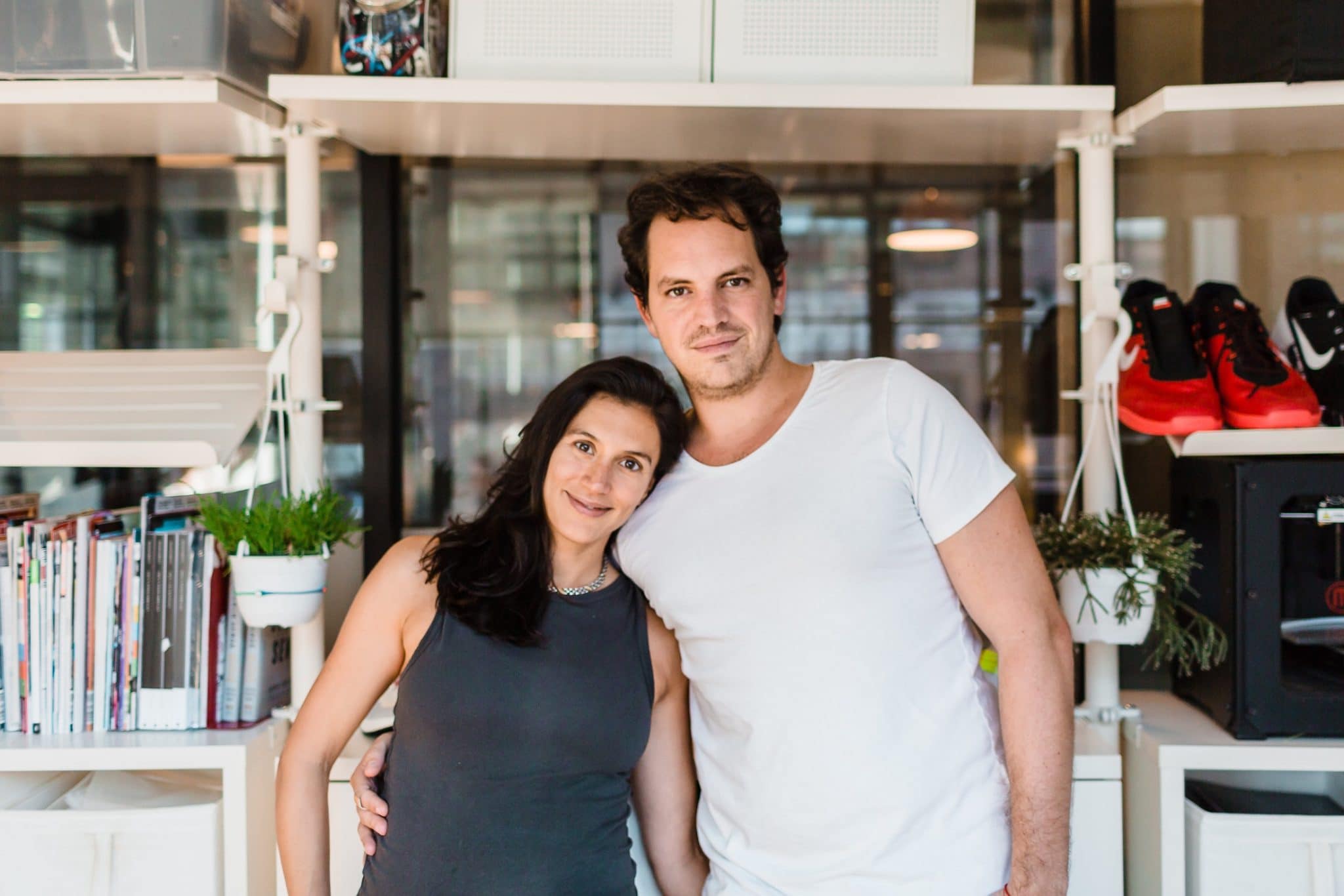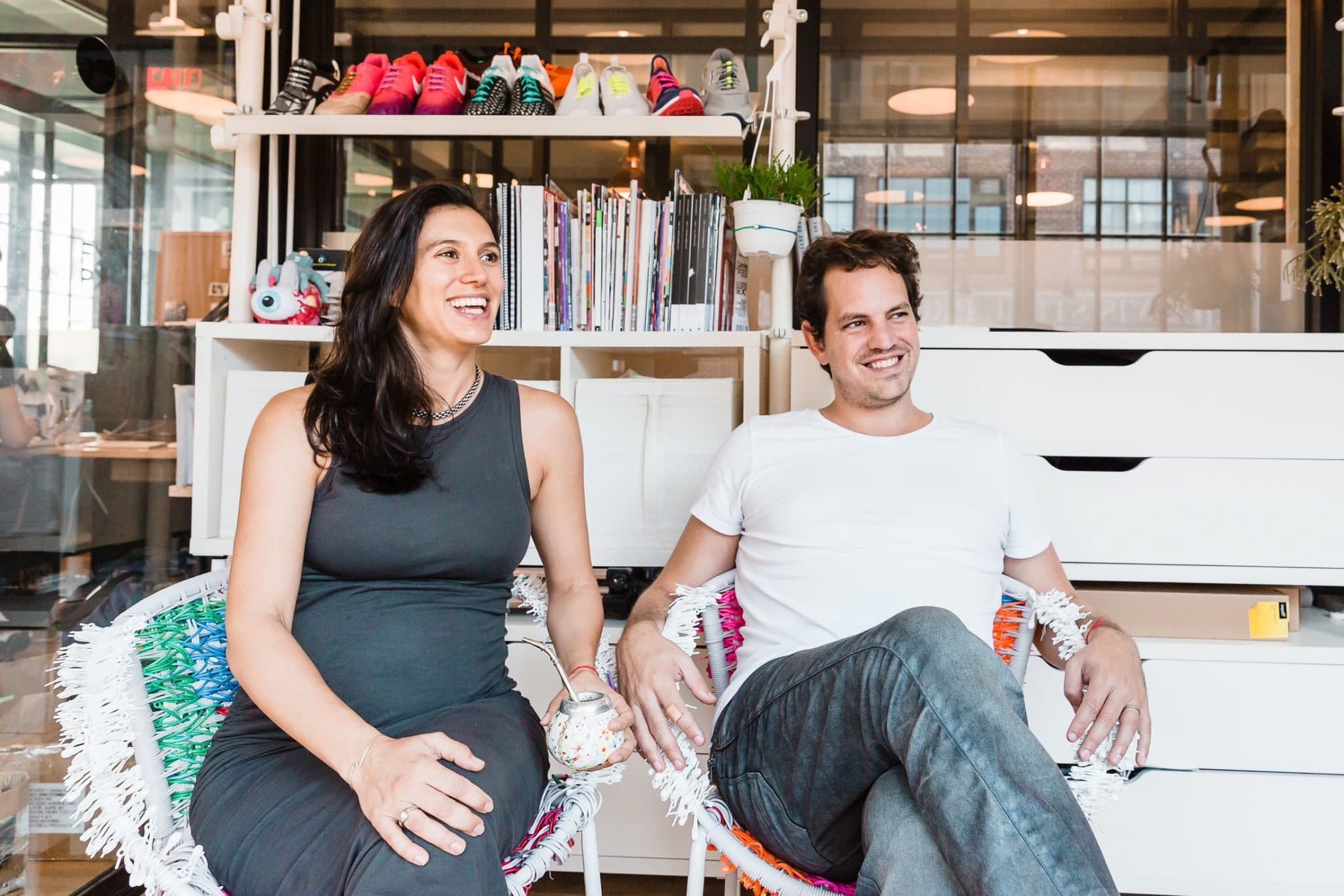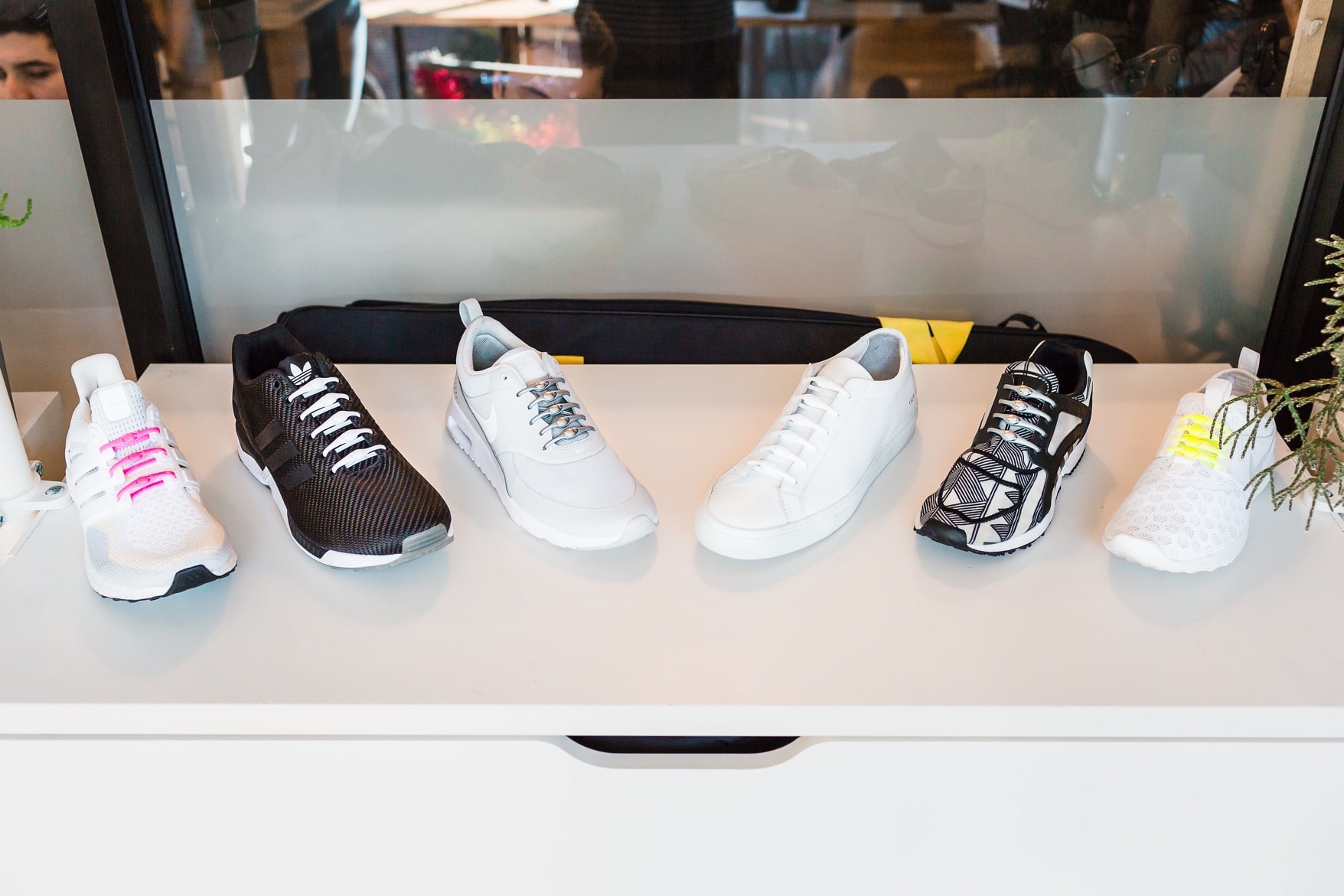Mariquel and Gaston’s deep care and respect for each other is mirrored in their decade-long journey to build Hickies, a no-tie lacing system that turns any pair of sneakers into a slip on and a company infused with love and ingenuity. During our chat, they revealed what they miss most about Buenos Aires and what was most challenging about moving to the U.S., shared their spiritual journeys, and laughed plenty.

What’s the story of how and why you started Hickies?
Gaston: Before the company, I used to be an investment banker and Mariquel used to own her own hotel in Argentina. As soon as we started dating and merging our lives, we realized that our work/life balance was not sustainable, at least not with our idea of family. So we said, “OK, why don’t we change this?” At that point, I had been working on Hickies for many years as my side project. I hated tying my shoes. It seemed very unnecessary. Everybody, from parents, athletes, the elderly, and even retailers – ever notice how they hide the laces on displays or in photographs? – have an issue with shoelaces.
Mariquel: Gaston had the idea when he was 21 years old, right out of college. He was working on the side and investing all his money and his savings, asking his family for money to keep moving forward with the project. We met when I was 21, as well, and we went out on a date and he showed me the sketches of his idea. He was very proud of it. At the time, I thought, “This is never gonna work, he’s crazy!” And now look at me. We’re building a company together around that idea.
Gaston: And you’re pregnant.
Mariquel: And I’m pregnant. When he puts his mind to something, he gets it.
How did you meet?
Mariquel: We met at a birthday party for a friend of mine. Gaston crashed the party. He was – he is – very good looking. Immediately, we started talking. We realized we were opposites, but he was cute, so I gave him a kiss anyway.
Gaston: That’s a true story.
Mariquel: We were on different paths. He wanted to be a hippie and travel the world. I wanted to have a professional career, I wasn’t thinking about marriage, I wasn’t thinking about having kids. He would call and I would say, “I don’t have time for a relationship.” That continued for 6 years.
Gaston: We reconnected when she was 28 and I was 29. We re-met at a wedding and haven’t been apart since.
Mariquel: It was the right time. I always thought he was hot. I always liked spending time with him. I was ready to embrace love.
What really works for you as a couple, especially since you work together?
Gaston: We are completely different, but we share the same essence. We might argue, but we always have a similar view on the core stuff. If you focus there, then all the fluff is sorted out.
Mariquel: When somebody says, “How can you work with your wife all day?,” Gaston is always confused – why wouldn’t that be ideal? We always compliment each other and say how much we love each other and how much we enjoy being together. We don’t make jokes about being married, like, “Ugh, being married sucks.” It creates a very pure space in a relationship and it’s as simple as that, just being really nice.
We’re very nice to each other. It sounds very basic, but it’s the key.
Where do you come from? Tell me about your early years.
Gaston: We’re both from Buenos Aires. We lived most of our lives there until 5 years ago when we moved to New York. Argentina has probably the third largest Jewish community, but my family was part of the first 13 Jewish families that arrived to Argentina and then to Buenos Aires. I’m a gaucho judio. But I don’t ride…
Mariquel: My mom’s family comes from France and my father’s family is from Poland and Ukraine. I know that I look Sepharadi, but I’m Ashkenazi. My mom was not born Jewish. She converted. She really loved my father and she loved being Jewish. She was the most Jewish of the whole family. She would encourage us to do Shabbat, and she learned how to speak Hebrew, and she put us into Jewish schools. I was raised with a Jewish identity that I appreciate very much because my parents died when I was young and being Jewish always felt like belonging to a community that was there to support me. No matter where I was in the world, it would be easy to make friends or to have a connection with somebody.
Other than the health care system, what do you guys miss the most about Argentina?
Mariquel: As Argentinians, the hardest thing to do in the US was to adapt to so many rules and red tape. I’m scared of filling out forms here. It’s never like, “Oh, I just forgot to put that, but you know, yes, I lived at that address before.” It’s like, “You didn’t complete this, and now it’s a big problem.” I have to do everything all over again and go through three governmental institutions because you’re a liar now. It’s like “No, I just forgot!”
Gaston: I think the funniest thing is when we walk our dog, everyone’s enforcing rules all the time. Like, I’m just standing with my dog and they’re like “You cannot stand here with your dog.” Like, a random passerby. Everyone is enforcing the rules and, of course, that’s also why we came here, because the system works so everyone wants to maintain it. That’s also the reason why we started the company here, because the systems and the rules do not work in Argentina. Everything that was hard there is easy here and everything that was easy there is very hard here. Here, if you want to see someone, you have to plan 3 weeks in advance.
Mariquel: Maybe it’s also very New York. In Argentina, it’s like, “Oh, you know what, I woke up, I don’t feel like going there for dinner or barbecue.” And here, it’s so offensive to do that.
Because it took you 3 weeks to get it on your calendar!
Mariquel and Gaston: Yes!

How have your thoughts about being Jewish changed as you’ve grown older and lived in different places?
Gaston: I went to a Jewish school and I didn’t connect with Judaism because it was all rules. No one was able to transmit to me the spirituality side. I had a very good friend from Argentina who was studying in a yeshiva here, which was very weird, because he was a guy who really liked partying, so it was like “OK, you’re in a yeshiva now trying to reform,” but he would spend the weekends with me and brought one of the books that he was reading and I started flipping through the pages and I discovered all the things that I really like about all the other traditions in Judaism. It was very easy to digest, because they were like short, little thoughts or comments by a rabbi. It was “Bringing Heaven Down to Earth.” It’s like daily meditations. Each one of them was very profound, so that’s how I connected back. It’s beautiful. It was this very deep level that no one ever told me about. That’s how I reconnected with Judaism. I found this layer that I couldn’t find before.
Mariquel: What I liked most about Judaism more than the religion was the traditions and how they created context for me to meet people and relate to people. What I really don’t like about Judaism and religions, in general, is the concept of right and wrong and punishment. Like, if you do this mitzvah you will get this. I went to Jewish school, so I learned Hebrew and I liked learning about history and religion, but I also danced, shot photography, did martial arts and was a part of running groups. I met people who were outside of the Jewish world, and I enjoyed that diversity. Coming to New York really opened up my knowledge of different paths that were alternatives to the religion I was given and actually made me more of a spiritual person.
Gaston: The problem with all organized religions is that they give you answers, and then you get attached to those answers, and if your answer is different from mine, then we don’t like each other. What it really teaches is that you and I have the same questions, so why don’t we connect on the questions instead of the answer?

What do you value in your friends?
Gaston: Our friends from Argentina are the same friends that we’ve had all of our lives. We don’t even need to speak and they know what’s going on. I think Argentina is the only country in the world where the biggest day of the year is Friendship Day. It’s the day when man landed on the moon, so the whole community comes together. Here, we’ve found amazing new friends, but it’s a different connection.
Mariquel: Here, we share the passion for work and professional development and living in New York. The hunger and the ambition and drive to get to the peak. What we find in Argentina is family and being very comfortable. Both are necessary. We feel we cannot be in one place anymore because what we are creating here and our friends here make us more interesting and complete people, but we can’t live without our family and friends in Argentina.
What is your favorite meal?
Mariquel: Gaston, what is my favorite meal?
Gaston: Anything healthy. She is able to enjoy when something is good for her. I’m the opposite. I need comfort food every day. If I have a bad day, I go across the street to Radegast and I eat a burger and I’m back.
Mariquel: I think I have a favorite condiment. I eat everything with lemon. I couldn’t live without lemon. From french fries to empanadas to pizza. Water with lemon. I would carry a lemon in my purse.
What’s a cause that you care about it?
Gaston: I never cared about the environment in the traditional way – recycling, all these little things that people do – because the problem is so macro. I thought the Earth would take care of itself. It will wipe us out, it will start again, and it will be fine. But, I’ve been reading this amazing book called Last Hours of Ancient Sunlight and it changed my whole perspective, but I don’t consider myself an ecologist.
Mariquel: We try to be as healthy as we can, we try to do what’s best for others, we try to support what we think is best for society and the environment and humanity. A lot of times, when you label yourself, it’s about your ego and what you want to do, how you want to be remembered. With Hickies, it’s not, “We’re changing the world!,” it’s more like, “We just make shoelaces.” They’re better than the traditional ones. That’s it.
Photos by Emanuel Hahn.
Thank you for visiting Arq!
Arq is no longer publishing new content. We hope you'll enjoy our archived posts.


